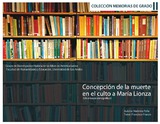Concepción de la muerte en el culto a María Lionza. Un ensayo etnográfico

Voir/
Date
2012-08-24Auteur
Palabras Clave
Culto a María Lionza, Muerte, Espíritus, Sincretismo, Colección Memorias de Grado. GRHIAL-2011Identity, Institutional image, Semiosis, Audiovisual boards, Sudiovisual communication, PDVSA
Metadatos
Afficher la notice complèteRésumé
Quizás, uno de los rasgos más resaltantes de la cultura
latinoamericana es su sincretismo religioso. Dentro
de ese indefinible espacio de una fantasiosa realidad
que compone nuestro más entrañable ser, convergen
y se entrelazan mitos y rituales de los más diversos
orígenes y procedencias. Nuestra investigación tiene
como principal objetivo reconstruir el imaginario
acerca de la muerte que poseen los marialionceros o los
creyentes en el culto a María Lionza. La investigación
de carácter etnográfico se llevó a cabo en Mérida
(Venezuela) entre 2007-2008. Se justifica, ya que
las investigaciones anteriores sobre María Lionza se
han centrado en el ritual, sus efectos en la salud,
la concepción de la enfermedad, la construcción del
mito, etc.; sin embargo, la muerte y los muertos no
habían sido vistos como objeto de investigación.
Colecciones
Información Adicional
| Otros Títulos | Perception of death in the cult of Maria Lionza. An ethnographic essay |
| Correo Electrónico | franco@ula.ve |
| Resumen en otro Idioma | Religious syncretism is perhaps one of the most prominent traits of Latin American culture. Inside this indefinable space of fantastic reality that builds up the very being of the Latin American person, myths and rituals of different origins are intertwined. The main goal of this research is to reconstruct the imagery of death that the believers in the cult of Maria Lionza or marialionceros have. The ethnographic study was carried out in Merida (Venezuela) between 2007 and 2008. The study is justified because previous research on Maria Lionza has focused on the ritual, its effects on health, the perception of illness, the construction of the myth, and others; however, death or the dead had not been tackled as the object of investigation. |
| Colación | 1-59 |
| Tutores | Franco Graterol, Francisco |





